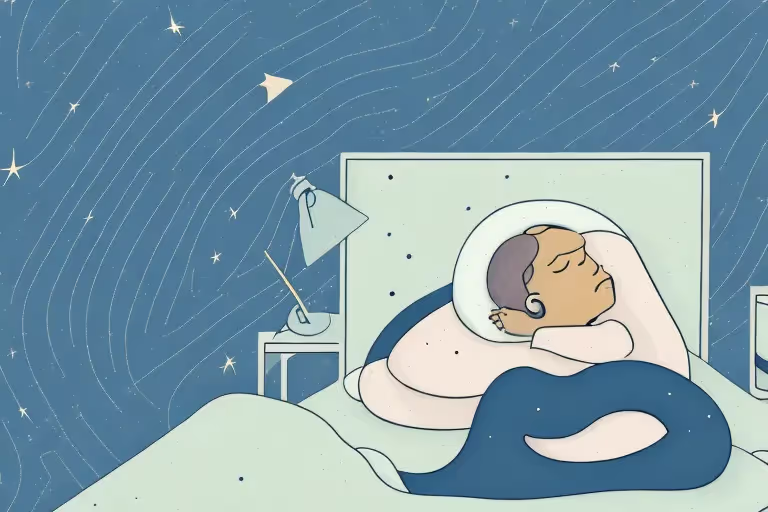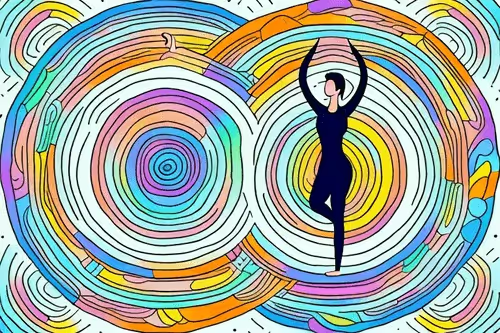Insomnia can be a frustrating and exhausting condition to live with. The inability to fall asleep or stay asleep can have a significant impact on a person's overall well-being and daily functioning. Fortunately, there are various treatment options available, and one such option that has shown promise in recent years is Zoloft.
Understanding Insomnia: Causes and Symptoms
Insomnia, a sleep disorder that affects millions of people worldwide, is characterized by difficulty falling asleep, staying asleep, or waking up too early. While occasional sleepless nights are normal for most individuals, chronic insomnia persists for at least three nights a week for three months or longer, leading to sleep deprivation and potential health issues.
Insomnia can be caused by various factors, each contributing to the disruption of the natural sleep-wake cycle. One of the primary causes of insomnia is stress. When individuals are overwhelmed by the pressures of daily life, their minds can become consumed with worry and anxiety, making it challenging to relax and fall asleep. Additionally, anxiety itself can be a direct cause of insomnia, as racing thoughts and a constant state of alertness can hinder the ability to drift off into a peaceful slumber.
In some cases, depression can also contribute to the development of insomnia. The emotional weight and persistent sadness that accompany depression can disrupt sleep patterns and make it difficult to achieve a restful night's sleep. Similarly, certain medications, such as antidepressants, stimulants, and corticosteroids, can have side effects that interfere with sleep, leading to insomnia.
Furthermore, underlying medical conditions can play a significant role in the development of insomnia. Conditions such as chronic pain, asthma, allergies, and gastrointestinal disorders can cause discomfort and disrupt sleep. Additionally, hormonal imbalances, such as those experienced during menopause, can lead to insomnia as well.
The symptoms of insomnia can manifest differently in individuals, but there are common signs to look out for. One of the most prevalent symptoms is difficulty falling asleep. Insomniacs often find themselves lying awake in bed, tossing and turning, unable to quiet their minds and drift off into slumber. This inability to initiate sleep can lead to frustration and heightened anxiety, exacerbating the problem.
Waking up frequently during the night is another telltale sign of insomnia. Insomniacs often find themselves jolting awake multiple times throughout the night, disrupting the natural sleep cycle and preventing them from reaching the deep, restorative stages of sleep. Consequently, they may wake up feeling unrested and fatigued, despite spending an adequate amount of time in bed.
Daytime fatigue is a common consequence of insomnia. The lack of quality sleep leaves individuals feeling tired and drained throughout the day, impairing their ability to function optimally. This fatigue can manifest as difficulty concentrating, reduced productivity, and increased irritability, negatively impacting both personal and professional aspects of life.
In conclusion, insomnia is a complex sleep disorder with various causes and symptoms. Stress, anxiety, depression, medications, and underlying medical conditions can all contribute to the development of chronic insomnia. Understanding the underlying factors and recognizing the symptoms is crucial in seeking appropriate treatment and improving sleep quality.
The Science Behind Insomnia
Insomnia is often linked to disruptions in the body's sleep-wake cycle, which is regulated by a complex system of chemicals and hormones in the brain. Serotonin, a neurotransmitter that regulates mood, plays a crucial role in this process as well. When the balance of serotonin is disrupted, it can affect sleep patterns and contribute to insomnia.
Research has shown that individuals with insomnia have lower levels of serotonin, which can lead to irregular sleep patterns and restless nights. This is where medications like Zoloft come into play, as they can help restore the balance of serotonin in the brain and promote healthier sleep patterns.
Common Symptoms of Insomnia
Recognizing the symptoms of insomnia is essential in seeking appropriate treatment. Insomnia can manifest in various ways, but some common signs to watch out for include:
- Difficulty falling asleep at night
- Waking up repeatedly during the night
- Waking up too early and being unable to fall back asleep
- Feeling tired and fatigued upon waking up
- Experiencing daytime sleepiness, irritability, or difficulty concentrating
If you experience any combination of these symptoms for an extended period, it may be worth discussing your situation with a healthcare professional to explore treatment options like Zoloft.
An Overview of Zoloft: Uses and Mechanism
Zoloft, also known by its generic name sertraline, is commonly prescribed for the treatment of depression, anxiety disorders, obsessive-compulsive disorder (OCD), and post-traumatic stress disorder (PTSD). However, its benefits extend beyond these conditions and can be beneficial in managing insomnia.
What is Zoloft?
Zoloft belongs to a class of medications known as selective serotonin reuptake inhibitors (SSRIs). It works by increasing the availability of serotonin in the brain, which helps regulate mood and emotions. By restoring the balance of serotonin, Zoloft can alleviate symptoms associated with mental health disorders and potentially aid in treating insomnia.
How Does Zoloft Work?
The mechanism of action of Zoloft involves blocking the reabsorption of serotonin in the brain. By inhibiting the reuptake process, more serotonin remains available in the synapses between neurons. This increased serotonin activity can lead to improved mood regulation, reduced anxiety, and potentially more restful sleep for individuals with insomnia.
Zoloft and Insomnia: The Connection
While Zoloft is not specifically approved by the FDA for the treatment of primary insomnia, it has shown promising results in numerous studies. When used off-label, Zoloft has demonstrated its effectiveness in improving sleep quality and reducing the severity of insomnia symptoms.
The Role of Zoloft in Treating Insomnia
By influencing serotonin levels and promoting more stable sleep-wake cycles, Zoloft can help individuals with insomnia experience better and more restorative sleep. The calming effect of the medication can also aid in reducing anxiety, which is often a contributing factor to sleep difficulties.
Clinical Studies Supporting Zoloft's Effect on Insomnia
Several clinical trials have evaluated the use of Zoloft for insomnia, demonstrating its potential as an effective treatment. These studies have shown that Zoloft can decrease the time it takes to fall asleep, reduce wakefulness during the night, and increase total sleep time. Additionally, improvements in sleep quality and daytime functioning have been reported among individuals using Zoloft for insomnia management.
How to Use Zoloft for Insomnia
If you and your healthcare provider determine that Zoloft might be an appropriate treatment for your insomnia symptoms, it is crucial to follow the prescribed dosage and usage recommendations.
Recommended Dosage and Timing
The dosage of Zoloft prescribed for insomnia may differ from the standard doses used for depression and anxiety disorders. Your healthcare provider will determine the appropriate dosage based on your specific needs and medical history. It is important to take Zoloft as directed and at the recommended time to optimize its effectiveness in improving sleep.
Possible Side Effects
As with any medication, Zoloft can cause side effects. Common side effects include nausea, headache, dizziness, and gastrointestinal issues. However, these side effects are often mild and transient. It is essential to discuss any concerns or questions about potential side effects with your healthcare provider.
Other Treatment Options for Insomnia
While Zoloft may be an effective treatment option for many individuals with insomnia, it is important to remember that there are other potential treatments as well. Depending on the underlying causes and severity of your insomnia, lifestyle changes, home remedies, alternative medications, and therapies may also offer significant benefits.
Lifestyle Changes and Home Remedies
Making certain lifestyle modifications can greatly improve sleep quality. These may include establishing a regular sleep schedule, creating a conducive sleep environment, practicing relaxation techniques, avoiding stimulants close to bedtime, and engaging in regular exercise. Additionally, certain home remedies like herbal teas, soothing music, and aromatherapy can promote relaxation and better sleep.
Alternative Medications and Therapies
If Zoloft is not suitable for your particular situation or if you prefer non-medication approaches, alternative treatments may be worth exploring. Cognitive-behavioral therapy for insomnia (CBT-I) has shown great success in addressing sleep issues by identifying and modifying negative sleep patterns and thoughts. Other medications, such as sedatives or melatonin supplements, may also be prescribed in specific cases.
In conclusion, while Zoloft is not specifically approved for the treatment of insomnia, it has demonstrated its potential in improving sleep quality and reducing symptoms associated with insomnia. If you are struggling with insomnia, discussing your options with a healthcare professional is crucial. They can guide you through the various available treatments and determine whether Zoloft or an alternative approach is the best fit for your specific needs.
When seeking support for your sleep and mental health concerns, consider using the Aura Health App. The app offers a range of helpful features, including guided meditations, sleep sounds, and therapy sessions, that can complement your treatment journey. By incorporating Aura into your daily routine, you can enhance your overall well-being and unlock a restful night's sleep.
Aura is Your All In One App for Meditation, Mindfulness Wellbeing
Find peace every day with one app for your whole well-being. There is no one-size-fits-all solution to mental well-being. Aura is the first all-in-one wellness app that learns how to best help you. Discover an endless library of expert-created tracks for your well-being, all taught by the world’s best coaches, therapists, and storytellers. With Aura's personalized recommendations, you can find peace every morning, day and night.



.webp)






.avif)

%20(1).avif)


.avif)
.avif)
.webp)


.avif)


















































































































.avif)

















.svg)









